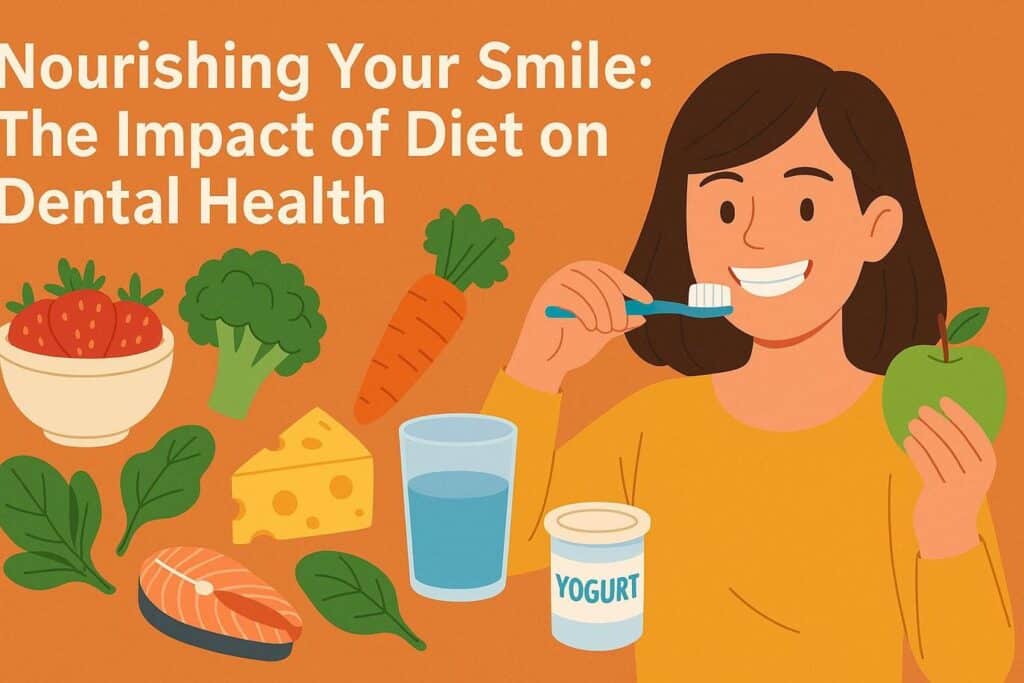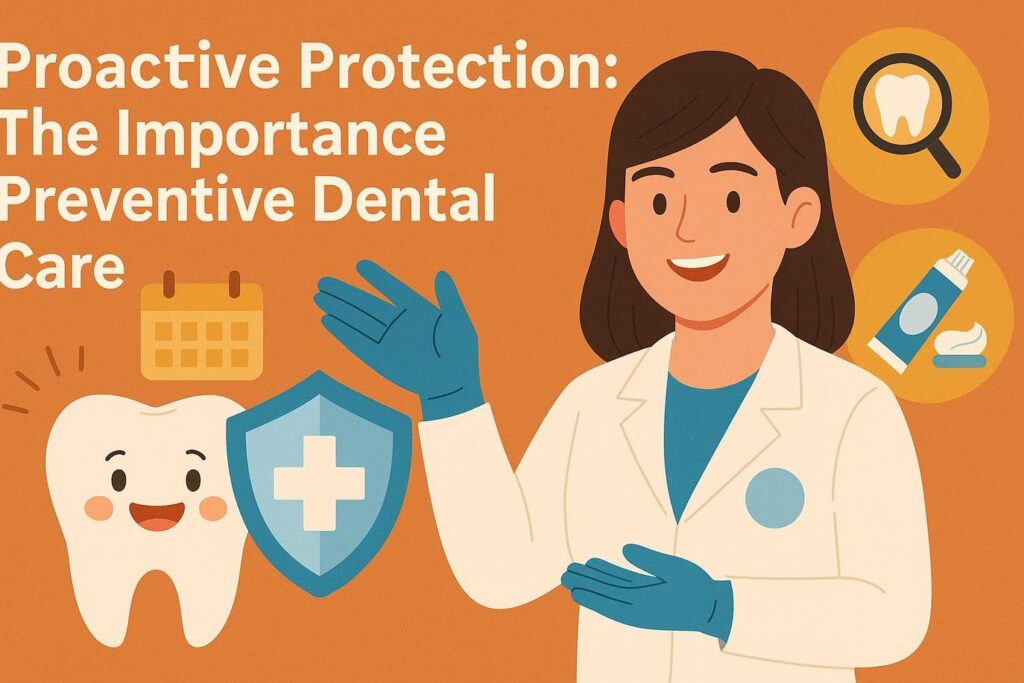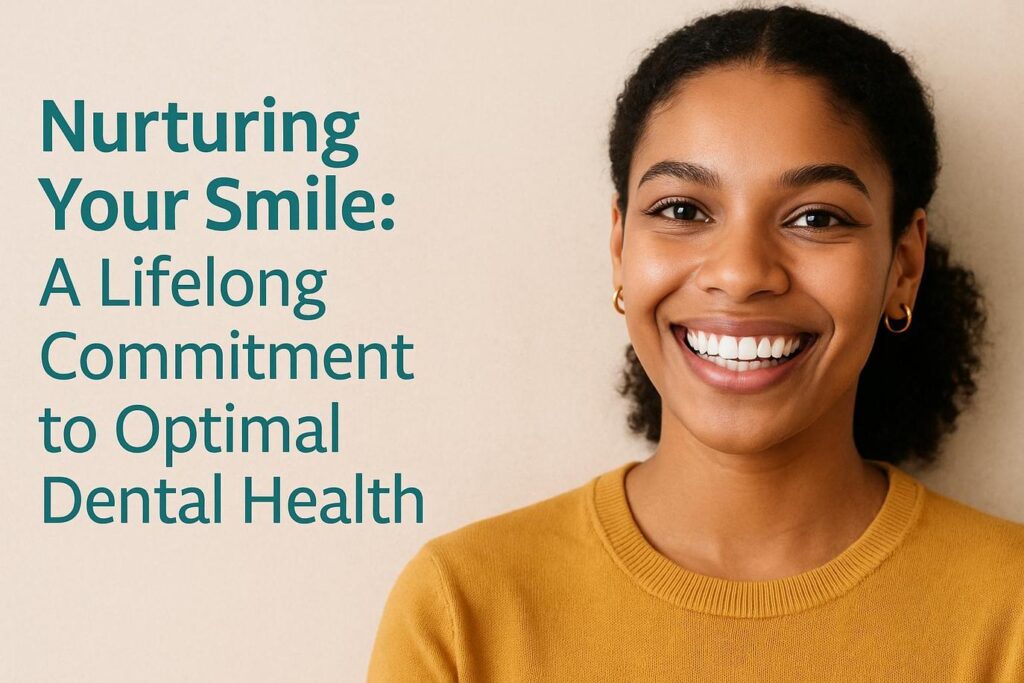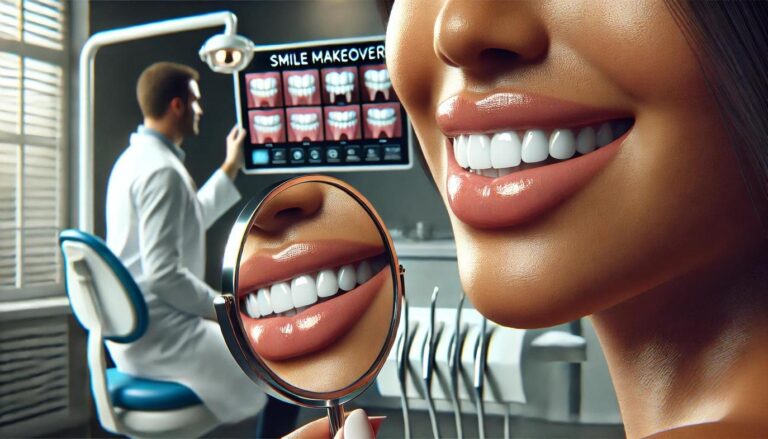Good dental health provides a beautiful smile and contributes to better nutrition and self-esteem. Proper care and good habits should be a lifelong commitment, as dental issues can arise at any age.
This guide offers practical advice for individuals of all ages, emphasizing the importance of regular dental check-ups, effective oral hygiene practices, and lifestyle choices that support healthy teeth. If you implement these tips into your daily routine, you can preserve your teeth and gums for years to come.
Building Your Foundation: A Consistent Oral Hygiene Routine
Laying the groundwork for healthy teeth begins with a consistent oral hygiene routine. This involves several key practices to eliminate plaque and prevent cavities:
- Brush thoroughly at least twice a day, ideally after meals or snacks, ensuring adequate time to dislodge all food particles.
- Floss once daily to remove plaque and debris from between teeth and under the gumline.
- Use fluoride toothpaste to protect and strengthen enamel against decay.
- Consider using products like toothpaste with nano-hydroxyapatite tablets. These can help remineralize tooth enamel and provide additional protection against cavities.
- Always brush gently to avoid damaging your gums.
Maximizing Your Routine’s Impact
This simple yet comprehensive routine significantly impacts your oral health and can save you from costly and painful dental procedures later. You can even incorporate an antimicrobial mouthwash into your regimen for an extra layer of defense against plaque and gingivitis while also keeping your breath fresh.

Nourishing Your Smile: The Impact of Diet on Dental Health
Your diet plays a crucial role in maintaining your dental health. Foods high in sugar can promote cavity formation. Conversely, a balanced diet rich in vitamins and minerals strengthens your teeth and gums. Key dietary habits include:
- Incorporating plenty of fruits, vegetables, whole grains, lean proteins, and dairy products to provide essential nutrients.
- Prioritizing foods high in calcium, such as leafy greens, almonds, and yogurt, to build strong teeth and bones.
- Staying hydrated by drinking plenty of water, which helps rinse away food particles and neutralize mouth acidity.
- Limiting acidic beverages like soda and fruit juices to prevent enamel erosion and avoid creating an environment where harmful oral bacteria can thrive.
- Avoiding frequent snacks between meals to lessen the frequency of acid attacks on your teeth.
Diet as a Proactive Dental Health Strategy
Achieving the right balance in your diet is a proactive measure that can have lasting benefits for your overall dental health. A balanced diet provides essential vitamins and minerals, like calcium and phosphorus, which are crucial for building and maintaining strong tooth enamel, making teeth more resistant to decay. Furthermore, limiting sugary and acidic foods reduces the fuel for harmful oral bacteria, thereby preventing enamel erosion and the development of cavities over time.
Protecting Your Teeth: Overcoming Habits Harmful to Oral Health
Certain bad habits can severely impact dental health and result in long-term consequences. It’s crucial to identify and address these behaviors:
- Smoking: This habit is strongly linked to gum disease, persistent bad breath, and an increased risk of oral cancer. Quitting smoking significantly improves dental health and promotes better overall health.
- Chewing on hard objects: Habits like chewing on pens, ice, or fingernails can chip, crack, or wear down your teeth and should be avoided.
- Using teeth as tools: Opening packages, cutting tape, or holding objects with your teeth can lead to accidental damage like chips or fractures.
- Teeth grinding (Bruxism): Often occurring during sleep, bruxism can wear down enamel, cause jaw pain, and lead to tooth sensitivity. If you suffer from bruxism, your dentist may recommend a mouthguard.
Eliminating these damaging activities and embracing better lifestyle choices are fundamental to sustaining good dental health. For instance, consciously choosing to avoid using your teeth as tools and opting for nutrient-rich foods over sugary snacks directly contributes to stronger enamel and healthier gums. Moreover, incorporating regular exercise and stress-management techniques can indirectly benefit oral health by reducing teeth grinding and boosting overall immune function.

Proactive Protection: The Importance of Preventive Dental Care
Preventive dental care is essential for maintaining a healthy mouth and catching potential issues before they escalate. This proactive approach typically involves:
- Regular Dental Check-ups: Visiting your dentist (usually every six months, or as recommended) allows for early identification of problems like cavities, gum disease, or oral cancers.
- Personalized Care Plans: Dentists provide recommendations tailored to your individual needs and oral hygiene habits.
- Professional Cleanings: These remove tartar (hardened plaque) and surface stains that regular brushing and flossing can’t eliminate.
- Additional Preventive Treatments: Depending on your risk factors, your dentist might suggest treatments like dental sealants or fluoride applications for extra protection against decay.
- Dental X-rays: These diagnostic tools help detect underlying issues not visible during a standard examination, such as problems with tooth roots, jawbone health, or impacted teeth.
Committing to regular preventive care allows for early intervention, often minimizing the need for more extensive and expensive treatments down the line. This forward-thinking strategy is a cornerstone of a sound dental health maintenance plan. Such diligence not only preserves your natural smile but also contributes to your overall well-being by preventing systemic issues linked to oral health.
Dental Sealants: An Essential Shield Against Tooth Decay
Dental sealants act as an effective barrier against tooth decay in children and adolescents. These thin protective coatings are applied to the chewing surfaces of molars, sealing out food particles and bacteria. By creating a smooth surface over the natural pits and fissures of molars, sealants significantly reduce the risk of decay, particularly in school-age children who are often more susceptible. This intervention is a preventive measure and is a key strategy in promoting long-term dental health.
Sealants for All Ages: Application and Benefits
Though associated with children, adults can benefit from sealants as well. If you have deep grooves in your molars or are at higher risk for cavities, discuss sealants with your dentist during your next visit. The application process is quick, painless, and can last several years with proper maintenance. Both children and adults utilizing sealants can contribute to better dental health outcomes.
Spreading Knowledge: Educating for Lifelong Dental Wellness
Awareness and education are critical components of a lifetime of dental health. Stay informed about the latest developments in dental care and oral hygiene practices by engaging with dental health workshops, online webinars, and informative articles that discuss the best practices for maintaining healthy teeth. This commitment to learning empowers you to make the best choices for your own care.
Furthermore, encourage your family and friends to take charge of their dental health by sharing useful tips, effective practices, and the latest dental innovations. When communities focus on education, the general perception of dental care improves. As a result, preventive measures are more likely to become the norm. Instilling good habits in younger generations is particularly impactful, as children benefit from learning about dental care early on, helping them develop lasting routines. Ultimately, remember that maintaining healthy teeth is a journey fueled by informed lifestyle choices and habits, and robust dental education empowers positive, lasting changes for everyone.
The Future of Your Smile: Staying Abreast of Dental Technologies
The field of dentistry constantly brings forth new technologies and practices that improve dental care, and staying informed about these advancements can empower you to make better choices for your health. Technological progress, from teledentistry to 3D imaging, consistently offers more convenience and efficiency in dental practices. For example, teledentistry has opened up new avenues for remote consultations and follow-ups, allowing patients to connect with dental professionals from home, while digital impressions make procedures like crowns faster and more comfortable by eliminating messy molds.
It’s beneficial to keep up with these developments to access better treatment options and benefit from improved patient experiences. Innovations in dental materials, for instance, now provide better durability and aesthetic results in restorations. Communicate openly with your dental care provider about what’s new in the field to facilitate informed decisions about your dental health and treatment plans.

Nurturing Your Smile: A Lifelong Commitment to Optimal Dental Health
Embracing the tips outlined in this guide is a direct investment in your well-being and a brighter smile. These practices range from establishing a meticulous brushing and flossing routine to understanding the impact of your habits and seeking timely professional advice. Remember, each positive step you take contributes significantly to preventing dental issues and preserving your natural teeth for years to come.
Dental technologies and our understanding of oral care are constantly evolving. Therefore, your commitment to learning and adapting your practices plays a crucial role. Continue to engage with your dental professionals, educate yourself on new preventive measures like dental sealants, and inspire those around you to prioritize their oral health. Your dedication today paves the way for a healthier, more confident you tomorrow.
Maintaining healthy teeth is an ongoing commitment that involves good oral hygiene, preventive care, diet, and lifestyle choices. Be proactive in your dental health for better overall health and well-being. Stay informed about new dental practices to fully leverage the advancements that modern dentistry offers for your lifelong oral health.
Your Dental Health Questions Answered: Key Insights for a Radiant Smile
How often should I visit the dentist for optimal dental health?
For most individuals, a dental check-up and professional cleaning every six months is recommended for preventive dental care. However, your dentist may suggest more frequent visits if you have specific dental issues, are at higher risk for cavities or gum disease, or have an ongoing treatment plan. Regular visits are crucial for early detection and maintaining healthy teeth.
Are dental sealants a good option for adults, or just for children?
While dental sealants are commonly applied to children’s molars to prevent decay, they can be highly beneficial for adults too, especially those with deep grooves in their teeth or a higher predisposition to cavities. Discuss with your dentist if sealants are a suitable preventive measure for your specific oral health needs.
What’s one common mistake people make in their daily oral hygiene routine?
A frequent oversight is not brushing for an adequate amount of time (at least two minutes) or neglecting to floss daily. Flossing is essential for removing plaque and food particles between teeth where a toothbrush can’t reach, which is critical for preventing cavities and gum disease as part of a consistent oral hygiene routine.
How can emerging dental technologies actually improve my dental care experience?
Emerging dental technologies, like teledentistry for remote consultations, 3D imaging for precise diagnostics, and digital impressions for more comfortable procedures, significantly enhance the quality, efficiency, and comfort of dental care. Staying informed about these new dental practices allows you to access better treatment options and make more empowered decisions for your dental health.




